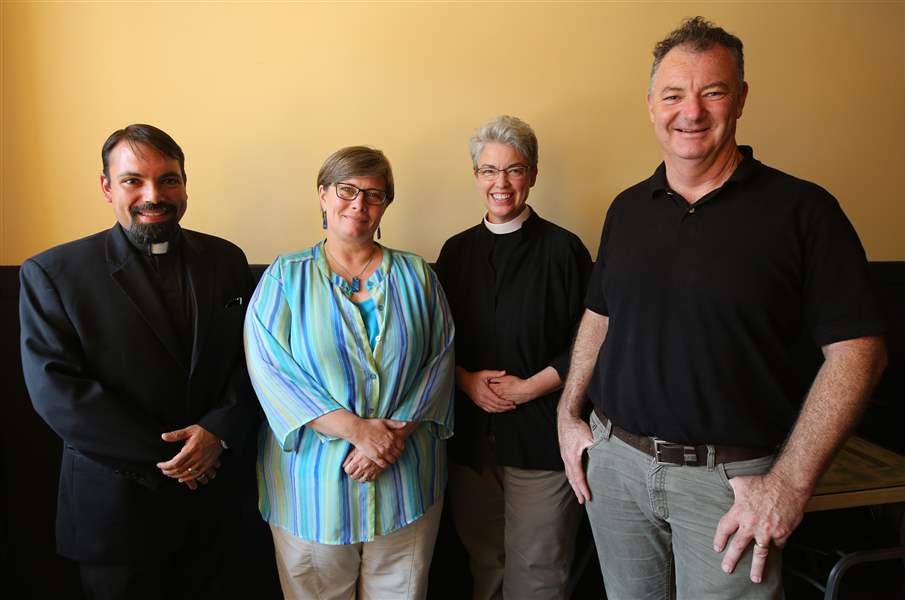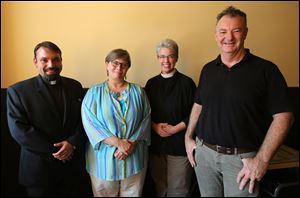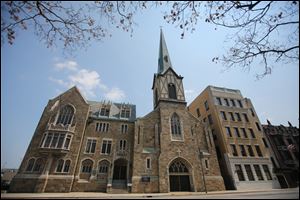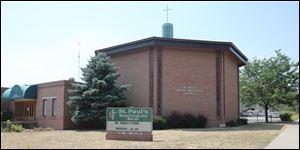
Challenges of downtown Toledo congregations discussed
8/2/2014
Left to right, Eleftherios Legakis of Holy Trinity Greek Orthodox Church, Mary Sullivan of St. Paul's United Methodist Church, Elizabeth Hoster of Trinity Episcopal Church, and Peter Bowmer of St. Paul's Lutheran Church.
THE BLADE/JEREMY WADSWORTH
Buy This Image

Left to right, Eleftherios Legakis of Holy Trinity Greek Orthodox Church, Mary Sullivan of St. Paul's United Methodist Church, Elizabeth Hoster of Trinity Episcopal Church, and Peter Bowmer of St. Paul's Lutheran Church.
Four ministers met recently to talk about their churches and their pastorates. Two are ministers from St. Paul's churches and two come from Trinities. Two are women and two are men. Two are new to Toledo and two are in the seventh year of service to their congregations.
What they have in common is that their churches—St. Paul's Lutheran, 428 N. Erie St.; St. Paul's United Methodist, 1201 Madison Ave.; Trinity Episcopal, 316 Adams St.; and Holy Trinity Greek Orthodox Cathedral, 740 Superior St.—are all in the center of Toledo, and have chosen to remain there. The ministers and their congregations have challenges and conditions that most neighborhood or suburban churches rarely face.

The congregations once were large and churchgoers lived close by, but membership is smaller now and most attendees drive in for worship. Many people who have no connection to the churches go there to ask for help, and while the perception is most are homeless, the reality is that many ask for assistance to stay in their homes. There is greater diversity among the worshipers. And the ministers said that some of their visitors end up serving the pastors with their stories.
“You may be a blessing to that person,” Pastor Mary Sullivan of St. Paul‘s United Methodist said, “but more times than not I've walked away thinking 'thank you' because that has changed my life in that moment. It's transformative.”
Rev. Elizabeth Hoster of Trinity Episcopal said that's why she became a pastor, and that seems to happen more in an urban setting.
“When Trinity did a renovation 11 years ago, that was a big decision for staying downtown,” Rev. Hoster said.

St. Paul's Lutheran Church.
The Greek Orthodox cathedral also renovated, the Rev. Larry Legakis said, “and they're going to celebrate 100 years next year, so they're very committed to that facility and they're very committed to being where they are.”
“How do we make it work? How do we connect?” Pastor Peter Bowmer of St. Paul’s Lutheran asked. His church is a “big old building, huge building. I've never worked before in a building that has a basketball court on the third floor. We're investigating things like could we open a gym, could we open a fitness center? How do we add value to the community?”
St. Paul's United Methodist burned down in 1979 and the congregation moved and rebuilt in the Uptown area. “We still struggle with keeping our doors open,” Pastor Sullivan said, “and partially that is because [to be a member] it takes someone very unique who wants to be a part of a social gospel, missional-focused, putting your time and not just your money into your church. [That] is what urban ministry tends to ask of its folks, and it is difficult to find.”
“From what we can gather, our local community is low-income, somewhat homeless, African-American, and then there's also the people moving to the apartments—young urban professionals, couples, gay people,” Pastor Bowmer, who moved from Australia six months ago, said. “So even though we're an older, established church, very predominantly white and aging, the people that come are very left wing and they're interested in serving a diverse community, interested in welcoming all the people I just mentioned.”
“When I started at St. Paul's, I was a newbie to urban ministry,” Pastor Sullivan said. “Coming from a rural setting into the inner city, what I found was we were moving more and more to being a social service agency and less and less towards being a spiritual formation space.” She wondered how her church can “build relationships with people versus being in missions for people?”

St. Paul's United Methodist Church.
“If we're going to serve the people that we say we're going to serve,” Rev. Hoster said, “how do we do it in working with people?” Her Trinity has given office space to nonprofit organizations that help people. “I don't think that's the whole answer, but if we're going to be who we say we are, if we're actually going to move into that, then we've got to look at what abundance we have and offer it to other people that need it.”
Father Larry, who is still in the process of moving from Louisville, is getting to know his members. “There's somewhere around 330 families, so I'm trying to figure out who they are, where they live, and then what kind of ministries the church is involved in.” He also said, “If you're not busy in September, a good Greek Orthodox priest always remembers to plug his festival.” That will be Sept. 5-7.
Pastor Bowmer used a parable to describe downtown churches. “Jesus told this parable about the wheat and the weeds, and how the weeds were sown among the wheat in the middle of the night and what are we going to do—should we pull out the weeds? And Jesus says no, we'll wait till the crop comes in. And I looked at the people and I said, 'I wonder what the weeds are thinking of us.' After all, wheat is really domesticated weed, and it's a very boring looking weed. …
“Sometimes these weeds are pretty, and to me that's downtown. People might look at us like it's full of weeds, but there's beauty in that, it's so pretty. And sometimes the weeds look at wheat and think, 'You're just getting in our way,' and sometimes with mainline Christian churches, that's what we're doing. … So get out of the way and let the weeds make the church.”
Contact TK Barger @ tkbarger@theblade.com, 419-724-6278 or on Twitter @TK_Barger.